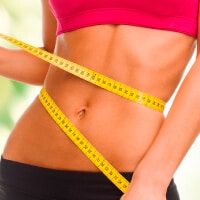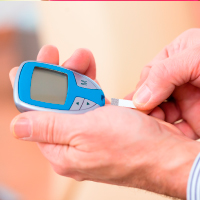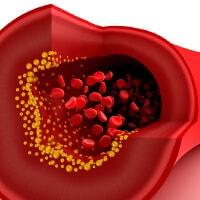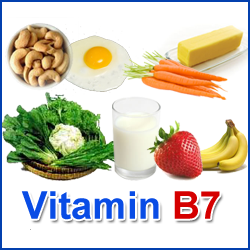Vitamin B7/Biotin Benefits, Deficiency, foods sources - Biotin, or Vitamin B7, is a water-soluble vitamin that’s a part of the vitamin B-complex- a group of key nutrients needed for healthy metabolic, nerve, digestive and cardiovascular functions.
Biotin acts as a co-enzyme in the body that’s needed for the metabolism of fatty acids, amino acids and glucose. This means that when we eat foods that are sources of fats, proteins and carbohydrates, vitamin B7 biotin must be present in order to convert and use these macro-nutrients for bodily energy, to carry out physical activities and for proper psychological functioning.
Biotin is also a nutrient that helps us keep a young, attractive appearance since it plays a major part in maintaining the health of our hair, nails and skin. In fact, biotin sometimes gets the nickname the “H” vitamin, which stems from the German words Haar and Haut that mean “hair and skin.” Vitamin B7 biotin is commonly added to hair and skin beauty products, although it’s believed to not be absorbed very well through the skin and actually must be ingested to be fully beneficial.
Biotin can be found in foods like organ meats, eggs, avocado, cauliflower, berries, fish, legumes and mushrooms.
Deficiency Can Prevent the Many Biotin Benefits
A vitamin B7 biotin deficiency is rare in nations where people generally consume enough calories and food in general. This is mainly because of three reasons: the recommended daily requirements are relatively low, many common foods provide biotin and researchers believe our intestinal digestive bacteria have the ability to create some vitamin B7 biotin on their own.
Biotin is water-soluble, which means it travels in the bloodstream and any excess or unused quantities present in the body are eliminated through urine. Therefore, the body doesn’t build up reserves of biotin and it’s very difficult to consume too much, for levels considered to be toxic are very rare. However, this also means that you must ideally ingest small amounts of vitamin B7 almost daily to keep your body’s supply high enough.
People who are at an increased risk for vitamin B7 biotin deficiency include those with the following:
long-term use of certain anti-seizure medications
prolonged antibiotic use
intestinal male-abBiotin, or Vitamin B7, is a water-soluble vitamin that’s a part of the vitamin B complex — a group of key nutrients needed for healthy metabolic, nerve, digestive and cardiovascular functions absorption issues or serious digestive disorders like Chron’s disease, celiac disease, or leaky gut syndrome
Although a biotin deficiency is very rare, when it does occur symptoms can include:
Daily Recommended Values of Biotin (Vitamin B7)
According to the National Academy of Science’s Institute of Medicine, the daily recommended value of biotin is:
Biotin (Vitamin B7) Supplementation
Vitamin B7 can be found as part of B-complex supplements, also sometimes called Adrenal Support Complex or Energy Complex supplements. These types of supplements usually include a full spectrum of B-vitamins, including vitamin B6, vitamin B12, vitamin B2 riboflavin and vitamin B3 niacin.
Together the B vitamin complex support metabolism activity, brain functions, nerve signaling and many other important daily functions. They also work with one another, so taking B vitamins together is always the best way to ensure you’ll get the most results.
If you plan to take B vitamin complex supplements, keep in mind that not all supplements are created equal. Purchase a high-quality multivitamin or supplement product that is made from real food sources and doesn’t contain fillers or toxins in order to get the most benefits.
These are made by joining together different collaborative nutrients so your body recognizes the vitamins and minerals and can use them in a synergistic way — similar to how they appear in food sources. Acquiring vitamins like vitamin B7 in this natural way gives you the most beneficial results and helps you avoid unwanted, ineffective, synthetic vitamin fillers and toxins.
Food Sources of Biotin (Vitamin B7)
There are actually eight different forms of vitamin B7 biotin, but only one is naturally occurring — the kind found in food sources. This type is called “D-biotin” and is believed to be the only type that has full vitamin capabilities. This is another example of why it’s always best to get your vitamins and minerals from real food sources whenever possible, since they include nutrients just as nature intended for the body to use.
In 2004, when researchers examined 51 different foods to identify how much biotin was available, they found a wide range of varying biotin levels within each food. For those reasons, many authorities (including the USDA) do not list the amount of biotin available in common foods. However, according to studies, the foods below were some of the highest to be tested, although you will see the amount of biotin within each still ranges quite a bit.
Here are some of the 9 best food sources of biotin:
Additionally, other berries, mushrooms and other types of fish are also thought to be good sources of biotin.
Interestingly, vitamin B7 is found exclusively in the yolk of the egg and is not at all present in egg whites. Some reports have shown that not only do people miss out on B vitamins when they only eat egg whites and discard the yolk, but that egg whites actually have the ability to deplete the effects of B-vitamins, too possibly evening creating a vitamin B7 deficiency.
Health Benefits of Biotin (Vitamin B7)
1. Supports a Healthy Metabolism

Vitamin B7 biotin regulates gene expressions that are critical in carrying out functions of the metabolism.
Vitamin B7, along with other B vitamins, is needed to convert the food you eat into useable energy that supports a healthy metabolism. Vitamin B7 does this in several ways: It converts glucose from carbohydrates and sugar sources into useable “fuel” that is the body’s preferred source of energy; it helps the body use amino acids from proteins to carry out multiple body functions; and it activates fatty acids from fat-containing foods like oils or animal fats.
Only once the body can use macronutrients from food for energy will normal, healthy metabolic activity take place. Vitamin B7 biotin also improves the metabolism and utilization of glucose, which is extremely beneficial in our society where cases of type 2 diabetes are so common.
Without enough vitamin B7 present in the body, symptoms of a sluggish metabolism may appear like low energy levels, fatigue, weight gain, digestive problems, possible development of diabetes, changes in appetite, poor moods, and more.
2. May Improve Glucose Intolerance and Help Balance Blood Sugar

Vitamin B7 biotin, especially when combined with chromium, has been shown to help lower blood sugar in people with diabetes. This is especially true for those who have blood glucose (sugar) levels that are not controlled well by prescription medicines.
Vitamin B7 benefits blood glucose levels because it facilitates the activity of insulin, which is the crucial hormone needed to bring blood sugar back to a balanced state. Better insulin response helps to reduce the risk of widely fluctuating blood sugar levels, which can lead to pre-diabetes, type 2 diabetes, weight gain and forms of metabolic syndrome.
Vitamin B7 biotin decreases the expression of enzymes that stimulate glucose production by the liver, therefore less sugar is released into the bloodstream. For this reason, vitamin B7 deficiency has been linked to impaired glucose tolerance and decreased utilization of glucose, which are risk factors for diabetes. Vitamin B7 can also help reduce symptoms of existing cases of diabetes, including nerve pain.
3. Maintains Healthy Hair, Skin, and Nails

Vitamin B7 is needed to maintain healthy skin, hair and nails — so when someone experiences a vitamin B7 deficiency, symptoms may manifest in the form of thinning, splitting and brittle hair, or dermatitis that results in dry, irritated skin. You may notice that biotin is included in many cosmetic face creams, hair masques and other over-the-counter beauty products for this reason, but vitamin B7 biotin is much more effective when it’s eaten rather than applied topically.
According to studies, taking high doses of biotin can help treat weak hair and nails. In fact, this benefit of vitamin B7 biotic was first discovered when horses were effectively treated with biotin to correct problems with the horses’ hoofs becoming brittle and cracked.
Vitamin B7 biotin can also help to protect skin from acne, fungal infections, rashes and severe dryness and cracking.
4. Protects Brain Function and Fights Cognitive Decline

Vitamin B7 benefits the health of the nervous system because of its role in nerve signaling and neurotransmitter activity. B vitamins together influence memory function and defend against age-related cognitive impairment, such as neurodegenerative disorders like Alzheimer’s disease or dementia.
Because of their role in synthesizing hormones that are related to a mood regulation, B vitamins like vitamin B7 help to keep up a positive mindset, boost energy and increase concentration.
5. Helps Maintain a Healthy Cardiovascular System

B vitamins like vitamin B7 play a part in defending against common causes of heart disease including inflammation, atherosclerosis (or plaque build-up in the arteries), heart attacks and stroke.
Vitamin B7 and chromium together can help improve cholesterol levels, according to studies. Vitamin B7 have been shown to have positive results with increasing “good” HDL cholesterol, while helping to lower “bad” LDL cholesterol. This is especially true in people with diabetes who are susceptible to heart disease.
6. Supports Thyroid and Adrenal Function

Biotin acts as a co-enzyme in the body that’s needed for the metabolism of fatty acids, amino acids and glucose. This means that when we eat foods that are sources of fats, proteins and carbohydrates, vitamin B7 biotin must be present in order to convert and use these macro-nutrients for bodily energy, to carry out physical activities and for proper psychological functioning.
Biotin is also a nutrient that helps us keep a young, attractive appearance since it plays a major part in maintaining the health of our hair, nails and skin. In fact, biotin sometimes gets the nickname the “H” vitamin, which stems from the German words Haar and Haut that mean “hair and skin.” Vitamin B7 biotin is commonly added to hair and skin beauty products, although it’s believed to not be absorbed very well through the skin and actually must be ingested to be fully beneficial.
Biotin can be found in foods like organ meats, eggs, avocado, cauliflower, berries, fish, legumes and mushrooms.
Deficiency Can Prevent the Many Biotin Benefits
A vitamin B7 biotin deficiency is rare in nations where people generally consume enough calories and food in general. This is mainly because of three reasons: the recommended daily requirements are relatively low, many common foods provide biotin and researchers believe our intestinal digestive bacteria have the ability to create some vitamin B7 biotin on their own.
Biotin is water-soluble, which means it travels in the bloodstream and any excess or unused quantities present in the body are eliminated through urine. Therefore, the body doesn’t build up reserves of biotin and it’s very difficult to consume too much, for levels considered to be toxic are very rare. However, this also means that you must ideally ingest small amounts of vitamin B7 almost daily to keep your body’s supply high enough.
People who are at an increased risk for vitamin B7 biotin deficiency include those with the following:
long-term use of certain anti-seizure medications
prolonged antibiotic use
intestinal male-abBiotin, or Vitamin B7, is a water-soluble vitamin that’s a part of the vitamin B complex — a group of key nutrients needed for healthy metabolic, nerve, digestive and cardiovascular functions absorption issues or serious digestive disorders like Chron’s disease, celiac disease, or leaky gut syndrome
Although a biotin deficiency is very rare, when it does occur symptoms can include:
- dry irritated skin
- brittle hair or hair loss
- lack or energy or chronic fatigue
- digestive and intestinal tract issues
- muscle aches and pains
- nerve damage
- mood changes
- cramps
- tingling in the limbs
- cognitive impairments
Daily Recommended Values of Biotin (Vitamin B7)
According to the National Academy of Science’s Institute of Medicine, the daily recommended value of biotin is:
- 5 micro-grams daily for infants
- 6–8 micro-grams daily for infants ages 7 months–3 years
- 12–20 micro-grams daily for children ages 4–13
- 25 micro-grams for adolescents
- 30 micro-grams for male and female adults over 19
- 30 milligrams for pregnant women and 35 milligrams for women who are breastfeeding
Biotin (Vitamin B7) Supplementation
Vitamin B7 can be found as part of B-complex supplements, also sometimes called Adrenal Support Complex or Energy Complex supplements. These types of supplements usually include a full spectrum of B-vitamins, including vitamin B6, vitamin B12, vitamin B2 riboflavin and vitamin B3 niacin.
Together the B vitamin complex support metabolism activity, brain functions, nerve signaling and many other important daily functions. They also work with one another, so taking B vitamins together is always the best way to ensure you’ll get the most results.
If you plan to take B vitamin complex supplements, keep in mind that not all supplements are created equal. Purchase a high-quality multivitamin or supplement product that is made from real food sources and doesn’t contain fillers or toxins in order to get the most benefits.
These are made by joining together different collaborative nutrients so your body recognizes the vitamins and minerals and can use them in a synergistic way — similar to how they appear in food sources. Acquiring vitamins like vitamin B7 in this natural way gives you the most beneficial results and helps you avoid unwanted, ineffective, synthetic vitamin fillers and toxins.
Food Sources of Biotin (Vitamin B7)
There are actually eight different forms of vitamin B7 biotin, but only one is naturally occurring — the kind found in food sources. This type is called “D-biotin” and is believed to be the only type that has full vitamin capabilities. This is another example of why it’s always best to get your vitamins and minerals from real food sources whenever possible, since they include nutrients just as nature intended for the body to use.
In 2004, when researchers examined 51 different foods to identify how much biotin was available, they found a wide range of varying biotin levels within each food. For those reasons, many authorities (including the USDA) do not list the amount of biotin available in common foods. However, according to studies, the foods below were some of the highest to be tested, although you will see the amount of biotin within each still ranges quite a bit.
Here are some of the 9 best food sources of biotin:
- Liver — 3 ounces cooked: 27-35 milligrams
- Eggs — 1 whole: 13–25 milligrams
- Yeast — 7 grams/about 1 tablespoon: 1.4–14 milligrams
- Salmon — 3 ounces: 4–5 milligrams
- Cheese (try organic goat cheese) — 1 oz: 0.4–2 milligrams
- Avocado — 1 whole: 2-6 milligrams
- Raspberries — 1 cup: 0.2–2 milligrams
- Cauliflower — 1 cup: 0.2–2 milligrams
- Whole Grain Bread (try Ezekiel bread) — 1 slice: 0.2–6 milligrams
Additionally, other berries, mushrooms and other types of fish are also thought to be good sources of biotin.
Interestingly, vitamin B7 is found exclusively in the yolk of the egg and is not at all present in egg whites. Some reports have shown that not only do people miss out on B vitamins when they only eat egg whites and discard the yolk, but that egg whites actually have the ability to deplete the effects of B-vitamins, too possibly evening creating a vitamin B7 deficiency.
Health Benefits of Biotin (Vitamin B7)
1. Supports a Healthy Metabolism

Vitamin B7 biotin regulates gene expressions that are critical in carrying out functions of the metabolism.
Vitamin B7, along with other B vitamins, is needed to convert the food you eat into useable energy that supports a healthy metabolism. Vitamin B7 does this in several ways: It converts glucose from carbohydrates and sugar sources into useable “fuel” that is the body’s preferred source of energy; it helps the body use amino acids from proteins to carry out multiple body functions; and it activates fatty acids from fat-containing foods like oils or animal fats.
Only once the body can use macronutrients from food for energy will normal, healthy metabolic activity take place. Vitamin B7 biotin also improves the metabolism and utilization of glucose, which is extremely beneficial in our society where cases of type 2 diabetes are so common.
Without enough vitamin B7 present in the body, symptoms of a sluggish metabolism may appear like low energy levels, fatigue, weight gain, digestive problems, possible development of diabetes, changes in appetite, poor moods, and more.
2. May Improve Glucose Intolerance and Help Balance Blood Sugar

Vitamin B7 biotin, especially when combined with chromium, has been shown to help lower blood sugar in people with diabetes. This is especially true for those who have blood glucose (sugar) levels that are not controlled well by prescription medicines.
Vitamin B7 benefits blood glucose levels because it facilitates the activity of insulin, which is the crucial hormone needed to bring blood sugar back to a balanced state. Better insulin response helps to reduce the risk of widely fluctuating blood sugar levels, which can lead to pre-diabetes, type 2 diabetes, weight gain and forms of metabolic syndrome.
Vitamin B7 biotin decreases the expression of enzymes that stimulate glucose production by the liver, therefore less sugar is released into the bloodstream. For this reason, vitamin B7 deficiency has been linked to impaired glucose tolerance and decreased utilization of glucose, which are risk factors for diabetes. Vitamin B7 can also help reduce symptoms of existing cases of diabetes, including nerve pain.
3. Maintains Healthy Hair, Skin, and Nails

Vitamin B7 is needed to maintain healthy skin, hair and nails — so when someone experiences a vitamin B7 deficiency, symptoms may manifest in the form of thinning, splitting and brittle hair, or dermatitis that results in dry, irritated skin. You may notice that biotin is included in many cosmetic face creams, hair masques and other over-the-counter beauty products for this reason, but vitamin B7 biotin is much more effective when it’s eaten rather than applied topically.
According to studies, taking high doses of biotin can help treat weak hair and nails. In fact, this benefit of vitamin B7 biotic was first discovered when horses were effectively treated with biotin to correct problems with the horses’ hoofs becoming brittle and cracked.
Vitamin B7 biotin can also help to protect skin from acne, fungal infections, rashes and severe dryness and cracking.
4. Protects Brain Function and Fights Cognitive Decline

Vitamin B7 benefits the health of the nervous system because of its role in nerve signaling and neurotransmitter activity. B vitamins together influence memory function and defend against age-related cognitive impairment, such as neurodegenerative disorders like Alzheimer’s disease or dementia.
Because of their role in synthesizing hormones that are related to a mood regulation, B vitamins like vitamin B7 help to keep up a positive mindset, boost energy and increase concentration.
5. Helps Maintain a Healthy Cardiovascular System

B vitamins like vitamin B7 play a part in defending against common causes of heart disease including inflammation, atherosclerosis (or plaque build-up in the arteries), heart attacks and stroke.
Vitamin B7 and chromium together can help improve cholesterol levels, according to studies. Vitamin B7 have been shown to have positive results with increasing “good” HDL cholesterol, while helping to lower “bad” LDL cholesterol. This is especially true in people with diabetes who are susceptible to heart disease.
6. Supports Thyroid and Adrenal Function

B vitamins like vitamin B7 biotin are needed for proper thyroid activity and defending against adrenal fatigue. The thyroid plant and adrenal gland are “master” glands that are responsible for multiple body states, including hunger, sleep, pain perception, mood and energy.
A deficiency in B vitamins can result in thyroid and adrenal complications — and thus create many negative symptoms, such as fatigue, weight gain or loss, trouble sleeping, and more.
7. Needed to Build and Repair Tissues and Muscles

Vitamin B7 helps in the growth and maintenance of bodily tissues, including to help repair and build muscles. When tissue or muscle is broken down, B vitamins like vitamin B7 biotin work to build back the strength of muscle and tissue that leads to growth.
B vitamins also help reduce inflammation that can result in muscle or joint aches, pains, or trouble moving. Even more seriously, a deficiency in vitamin B7 and other B vitamins can stunt growth and result in improper development in fetuses and infants. This is one reason why acquiring enough vitamin B7 biotin and all other B-vitamins is crucial during pregnancy.
A deficiency in B vitamins can result in thyroid and adrenal complications — and thus create many negative symptoms, such as fatigue, weight gain or loss, trouble sleeping, and more.
7. Needed to Build and Repair Tissues and Muscles

Vitamin B7 helps in the growth and maintenance of bodily tissues, including to help repair and build muscles. When tissue or muscle is broken down, B vitamins like vitamin B7 biotin work to build back the strength of muscle and tissue that leads to growth.
B vitamins also help reduce inflammation that can result in muscle or joint aches, pains, or trouble moving. Even more seriously, a deficiency in vitamin B7 and other B vitamins can stunt growth and result in improper development in fetuses and infants. This is one reason why acquiring enough vitamin B7 biotin and all other B-vitamins is crucial during pregnancy.



